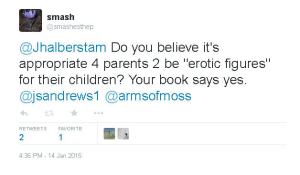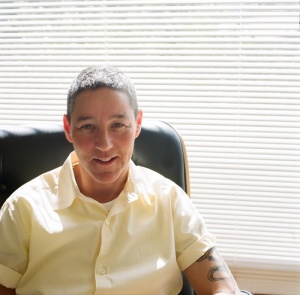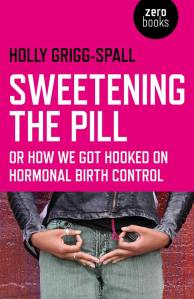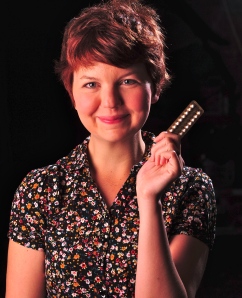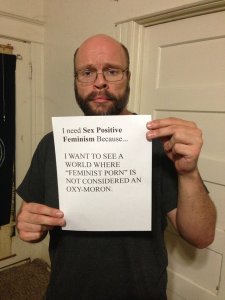MichFest: One Year Ago
August 2, 2016 1 Comment
One year ago, I arrived at the Michigan Womyn’s Music Festival for the first time after hearing about it for years. It was an amazing experience and it changed me forever.
At the time, I wrote about my experiences, but since they were so personal I shared them in bite sized pieces on tumblr, feeling that I wasn’t ready for them to be exposed to a wider audience and all together.
On this important anniversary, and the first year without a MichFest, I have decided to share them here. Many women are grieving this loss for what it is. But there is hope. Womyn are creative, innovative, and powerful. Amazons get shit done. This is not the last time we will gather.
Here are my words from last year, interspersed with some photos for you all.
Arriving at MichFest: Challenges and Gratitude

I took this picture on the road outside MichFest, before we turned into the forest. Beautiful midwest skies.
The night we arrived finally was preceded by a full day. Strange women, only knowing each other from the internet, piled with too many tarps and groceries, drove from Grand Rapids, through small town Hart, Michigan, to a grassy pastoral scene on the side of a two lane highway. Well, here’s the line. Cars off the side of the road stretched for miles. We didn’t have any idea we’d be in the car lined up for eight hours. We were three strangers who internet-know each other, with open windows in humidity and bug bites, or cooling off in air conditioning and sweaty human smells. We finally turned right onto the three mile road leading to fest, and were able to sneak off into the woods to pee. I recognized the woods- they were so very like the green canopy of leaves in the Midwest town where I went to graduate school.

We kept ourselves busy discussing the reddit board they moderated, and many cartoons I had never heard of. We got goofy and sang little mermaid and other Disney songs. We listened to Ani DiFranco, and we waited.
When we finally made it to turn in our tickets for wristbands, it had been dark for many hours, yet that was only the beginning of the ordeal. An orientation video and work shift selection awaited. The video appeared to be a VHS copy with occasional lines streaking through it from being shown so many times. It showed images of children standing under tents, and topless women chopping potatoes. It explained the fest experience, and what we should expect. Then it was to the next tent, where clipboards showed work schedule availability. The work shift choices were getting slim, but I selected a shift at Sprouts (childcare) and one at the Kitchen. Next it was on to the shuttle, where we piled our gear next to a white metal van to take us up to Triangle (one of several drop off points on the land). The shuttle got packed up with people and parcels. I sat on a cooler, and near the open door, so as I watched the trees slap the roof I felt fear that I would fall out of the vehicle. I had flash backs of being dumped out of a raft into white water the previous summer, and in my head, I thought “this is a lesson for me. I should learn not to step out of my comfort zone,” as I worried and worried about falling out of the van. Also, I wondered, where is my head lamp?
When we arrived at Triangle, I pulled out my Christmas decorations (to decorate my tent) for use in place of my lost headlamp. The battery box kept dropping the double A batteries out on the path, so it wasn’t a reliable source of light. Besides that, the woods were very, very dark, as no decorations had yet been put up to light the way. I didn’t know how we were going to find a place to camp that night. My bag was 47 pounds and as I dragged it down the dirt path, the wheels would give out and it would spin over. I would flip it back onto the wheels again for a bit, and then it would dump over again. I kept apologizing to my new friends for delaying them, and finally I gave up using the wheels. I then dragged it upside down, so heavy and miserable, along with my carry-on bag filled with clothes. Finally, I began to despair. Where! How! can I go on! My new friends went ahead of me on the path to find a spot as I waited in the dark. I tried to put the pack on my back so I got down, stuck my arms through the handle straps, and placed my knee to the wet ground, and tried to stand. I then found defeat, as my legs couldn’t lift the weight on my back and I began to cry. I silently screamed in frustration, and my face was covered in sweat and tears. I don’t know anyone, it’s dark, I’m exhausted! I. cant. *do*. this. Women came down the path and asked if I was okay. I dried my tears and calmed down as my friend came to get me. They had found a good camping spot not too far away, and she helped me bring my gear (thank you!). We began to set up our tents, as I hung my blue Christmas snowflake lights around my neck for light. Moths flapped at the light near my neck, as I shoved tent poles in sleeves and finally got it up. I placed my gear inside, and lay on top of my sleeping bag. Finally, alone, I could rest. I cried, and curled up, and sobbed for loneliness and fear. I felt I had made a mistake. What was I doing here? I was embarrassed that I was having such a hard time, and exhausted after all I had endured. I thought I was tougher than this. It was two am, and I finally crawled into the sleeping bag and drifted off into the night.
My MichFest story is not about a perfect paradise, but rather, a narrative about overcoming, my strength, and the power of other women. All week it was a struggle to stay hydrated and fed, clean and sanitary. The humidity was constant, and sticky was the new reality. My air mattress battery fiasco meant I slept on the hard ground all week (thankful for my 5$ pillow!). I kept losing things. I had short term memory problems- possibly due to exhaustion, or over stimulation, or potentially due to the extra emotions I kept experiencing. My feet, ankles, knees, back, and arms were always sore, and there was a lot of sitting in the dirt or grass.
Despite these challenges, MichFest was one of the most amazing weeks of my life. I learned a lot about myself as a woman in her 30s with body image and confidence issues, and felt the pull of radical feminist revolution. I was able to extract patriarchal perspectives and discard them from clouding my reality (for the most part). I found easy laughter poured from me and tears welled up many times a day- but grateful tears, of sadness at the end, potential for beginning, and awe at the love women have for each other and the community. The potential of another world where we help one another, a more liberated existence, and the freedom from men’s visions.
I don’t know why the coffee at MichFest is so delicious, but it tasted amazing. I loved stopping at Saints (the food and drink vendor) for a morning calzone and coffee (cream and sugar added) while I microwaved my pepperoni and cheese calzone, making sure to leave the DART nuker for those women who needed it. Sometimes I would spot a friend and we’d enjoy the morning together, and sometimes I would sit on a leaning bench alone and listen and watch women at the August night café learn to couples dance while I perked up from the drowsiness. I can still taste the coffee, the cream and sweetness, hear the sound of women talking and laughing, feel the breeze in the trees, and see blue sky peeking out of clouds, or the shade I escaped into. I loved the opportunity not to rush or worry that I needed to be somewhere, or find out what time it was. I could let the day begin on my own time frame.

The weather was perfect at Michigan. It rained hard one night, but I found myself always looking up whenever I could.

Hammock hung by the movie tent.
Opening Ceremonies at MichFest
Opening ceremonies were very powerful, as Stacyann Chin spoken word spoke what our hearts wanted to say. Then her mic had issues right at the end, and the mc Elvira Kurt joked that fest didn’t want to end, so it was just being prolonged a little bit longer. The music was amazing, and the drumming women, and all the signs thanking amazon women, workers, campers, etc. Ah, lovely. Then it got dark and Skip the Needle came on. A friend and I got up front to dance, and women started crowd surfing. I hadn’t been in a mosh pit like that in over 10 years, but it was amazing to dance and see women so free together. We danced for hours that night until we were so exhausted. Then we went back to the fire pit near our tents before we finally went to bed.
I didn’t take any photos of the opening ceremonies, because I was too busy participating. I wish I had some now, but I’m also grateful for the ones I have.

The Women’s Liberation Front put on a conference within MichFest.
I spent time with radical feminists at the Radfem Tree and the Rhapsody tent, where we discussed activism and the truths of our lives. We ate meat and eggs, and drank coffee, and I was so grateful to be a part. I truly belonged. I curled up and listened to radical songs, and I shared my beliefs and feelings without censorship. We talked about the harms of gender, and how to practice sisterhood. There were hugs with women I had just met, and others I have struggled together with before. What a relief it was for this one radical event to not have to worry about a venue cancellation due to threats and harassment. I treasured each moment with my radical feminist sisters.

Some sisters marked a tree near the kitchen with this sign so that radical feminists would have a place to gather together for meals.
My shift in the kitchen was challenging. My feet were already hurting (I was still recovering from a twisted right ankle) and I had unwittingly signed up for the busiest food event- burrito night. It was actually more like taco night, as women were given tortillas to load up with rice, beans, tomatoes, cheese, lettuce, and sour cream.
At fest, you are supposed to slide your plate/bowl/Tupperware across the table as you move from station to station to avoid having your plate above the foot trough and have food fall into your bowl and then back into the communal tray. If this happens, the communal tray will have to be thrown completely out, due to cross contamination. So a big part of my job was making sure that sisters were mindful of this requirement. At one point, the tongs for the tortilla chips were contaminated so we didn’t have any for about a half hour, but since women weren’t able to reach in and grab chips, they either had to pour them into their dish, or we could do it for them. It was challenging to communicate and also make sure that women knew they could take as much food as they wanted. We also wiped up any spills with a soaked rag, which dried my hands out pretty quickly.
It was neat to see the ways that women worked together to get more food when needed, and to combine old food containers with new ones as they arrived. Shifts are four hours long, and when my dinner break came, I was so worn out. It had been an exhausting shift, and the delicious food I enjoyed as a reward made it worth the challenge. It was great to work with sisters- I’m glad I decided to do a kitchen shift, despite the difficulty and exhaustion. After that I met at the Radfem tree with my feminist sisters. I just loved being surrounded by radical women in the woods.

Art at the night stage.
Camping with women I hadn’t met before was unique, but we ended up bonding in a profound way. Laughing, listening to music, and eating together. Hugs goodbye at the airport were emotional. I know what a sister is, although I had forgotten. I found myself again at MichFest, and I am so grateful.

Total relaxation awaits at the Day Stage.
The day stage was some of my very favorite experiences at MichFest. It was so nice to listen to women play guitars, or electric violins, or rock out with drums while relaxing together with sisters. I loved seeing girls and women hula hoop or sit on blankets together, or watch the deaf women’s translator express the emotions of the sound through her body and facial expressions. The music was also *really* good. These women were great song writers who created sonic joy through their rhythms and voices. I felt like I was witnessing power as I sat there, and it occurred to me on several occasions that I had internalized misogyny myself. The fact that I was surprised that the artists were so good was a reflection of the way that women are devalued outside of Michigan, and how I had taken those values in my own heart. I teared up with emotions as women sang songs about the future, of personal pain, and of ways they had found empowerment. Reina Williams’ cover of Aaliah’s Are you that Somebody was wonderful, and then when she did the “baby” part- ah, I smiled with nostalgia (you can listen to a version here). Mazzmuse’s electric violin sounded amazing, and she truly rocked the house. Crys Matthews made me tear up with the truths she expressed (her song “Holding Space” is about the end of MichFest and can be listened to here). It was so lovely.
One day after the music ended, the emcee decided that we would begin the first MichFest Bush Off. She wanted to start a contest to see which woman’s bush had the most retro 1970s look. I actually thought this contest was a ton of fun, because women were so comfortable with each other and the fact that we all have female bodies that it wasn’t objectifying at all- it was just hilarious! One woman had a merkin, and as women got up to show what they had grown themselves, women judged which was the fullest and covered the largest area of the body. It was excellent to see body hair being celebrated and normalized. Ah, MichFest- these things can only happen here, it seems. Honestly the bush off was one of my favorite parts of fest, because it was all about being natural and free. No, I’m not going to tell you who won.
*Note* A version of this short subpost will be published in the January 2017 edition of Sinister Wisdom.
What is the value of taking your top off? Outside of fest, it’s often for the male patriarchal gaze. At fest, it’s to free oneself from the shame of being a woman, a woman who grew breasts in puberty, and now has large nipples, or lowered heft in her bosom, or small breasts with dark nipples, or hair surrounding her areola. Fest nudity shows us that we *are* common, despite the diversity in our embodied flesh. Cellulite, C-section scars, stretch marks, swaying puckers and shimmying behinds … we walked through a cup overflowing of female realness and stated through our existence: I am the way I am, and no changes are needed. Many women had handsome facial hair and let it grow, unashamedly. No, I felt them say, I’m not a man because I have hair where adult women naturally grow it. I am a woman, I am real, and I am acceptable.
I never publicly disrobed except to shower. I had lingering feelings that somehow I was worse, or more disgusting, than my brave nude sisters in my pooches and red lightning stretch marks down belly and thighs. But there were moments, smiling moments of freedom from these lies as I crow barred them out of my consciousness. I loved my reflection in the mirror beneath sun hat or scarf or soaking showered hair. I saw my smile and my eyes smiling back. Bouncing along the paths, saying hello to neighbors, looking at decorations on my way to the janes or the kitchen. Changing my clothes in the tent and stopping to check for ticks, getting distracted by the wonder of my own skin under my hands, the width of my hips, the balance of my thighs, and the globes of my breasts. My freedom for me, I accepted for a moment, the land beneath me, and all her gifts. I am a daughter who claimed the sheer unlimited pleasure of being alive.

We spent a lot of time under this emerald canopy.
At the closing ceremonies, one thousand women were given candles for the end of the candlelit service. The only light had been dusk as it slowly turned into night. The trees framed the acoustic stage, and I stood on the edge of a bowl of women whose eyes faced the drums, the guitars, the piano, and the dancing women. I also hold that female sovereignty over our own bodies and lives is the first requirement for the new world we envisioned for one week in August. It’s a short way to refer to what we had begun to create, but it is not the end. I agree with many radical women who say that we’d rather this truth be acknowledged and face the end of fest, rather than compromise on this truth and see fest continue. Already the seeds of MichFest are beginning to bloom in states and countries everywhere, and the anticipation of this future fills me with excitement and a sense of being part of women’s history.
The closing ceremony asked that we snuff our candles out, as a signifier of the end. I wet my fingers and closed them on the burning wick, as women around me did the same. Then the mourning, painful howls began. We howled into the darkness- wolf howls of grief, of power, of female sovereignty, of home, and of love. So many howls whooping into the night, then died down, then from here to there began again, as we walked to our separate destinations on the land. Tearfully, we comforted each other through our presence together.
I treasure my candle, the flame of Michigan, and the power of women symbolized in its flame! As Crys Matthews sang, this is just so long for now/this is not good bye. I believe it, I hope for it, we make it, and we live it. Amazon women, rise. Now. In your town, in your family, your friendship, your hearts. We are women and we rise.
There are many emotions when it comes to women centered events. By celebrating you, I celebrate myself, and reject patriarchal existence. I find my place among sisters, and become valuable just as I am. Thankful, grateful, and passing it on.

Encouraging signs like these are posted all around the Land. This one is particularly inspiring to me.
Drum Circle Fire Pit at Triangle
After Sunday’s closing ceremonies, we went to Triangle fire pit, which was cold. There was no fire. We waited a few minutes, until women came and said that there was not any wood left to burn, as the logs had all been used throughout the week. But, we could collect burnables and start the fire again if we wished. So in my long blue sun dress, with my ever dimming head lamp, I hauled into the woods to knock down dead stumps and contribute logs for the fire. I am a frequent camper, so it was not an unfamiliar process, but the importance of the circumstance gave me particular strength. We needed fire, and I can collect fuel. So once I had contributed a share, we sat around the deep dirt pit and the drums began. More women came. Several women slapped their hands and arms on the drums together, and a lovely naked woman danced as the fire shadows moved over her. We began chants, and songs, and we sang rounds, we clapped, and we looked into one another’s faces.
As women, we felt the importance of the ritual. We taught one another songs, and we listened and learned and all participated. I could have stayed there all night, but we had to load out in the morning, so reluctantly I left the sacred circle and went back to my tent one final night.
I couldn’t believe it was ending. I still don’t feel that it has. At the same time, it’s hard to believe it ever really happened. It feels dreamlike, because it was so different from the rest of my life. It’s been hard to write about fest because of this disconnect- I don’t really know how to use words to communicate my experiences. But I am so, so grateful I have had them.

This sign hung off a path near where we camped in Bush Gardens.
Thank you all for reading about my experiences. There are, of course, many more wonderful things that happened at MichFest, and I only opted to tell you of a few of them. Coming back to the airport after spending a week with women was jarring, as it felt like what I had just experienced was dream-like. In a way it was- women created an amazing place that lived for 40 years. There is no where on earth quite like it.
I feel like I have been a participant in womyn’s history. It’s hard to describe how wonderful it is to have been there, and also how bittersweet I feel that it has ended. I am sure it must be much more difficult for womyn who had the pleasure of attending for many years. I do believe something else- or many somethings- will come out of this community in future. As this sign says:
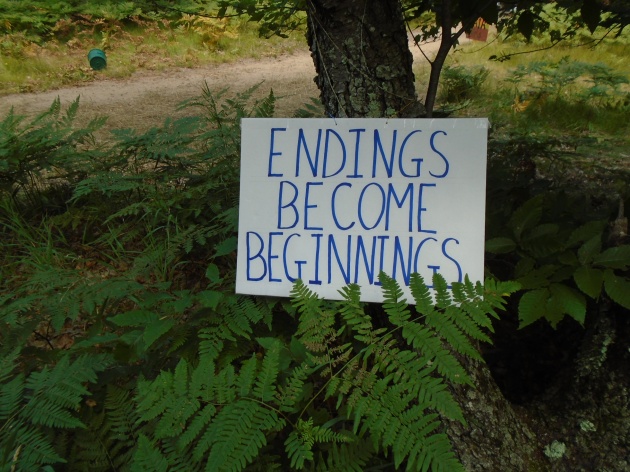
Words to live by.



